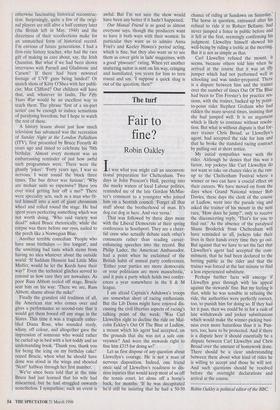The turf
Fair to fine?
Robin Oakley
It was what you might call an unconven- tional preparation for Cheltenham. Two days in John Prescott's Hull, peering into the murky waters of local Labour politics, reminded me of the late Gordon McMas- ter's comment to a youngster who joined him on a Scottish council: 'Forget all that stuff about the brotherhood of man. It's dog eat dog in here. And vice versa.'
That was followed by three days more with the Liberal Democrats at their spring conference in Southport. They are a cheer- ful crew who actually debate each other's comments rather than reading career- enhancing speeches into the record. But Philip Lacier, the American Ambassador, had a point when he exclaimed of the British habit of annual party conferences, `Either your parties are more democratic or your politicians are more masochistic,' and it puts a party which holds two confer- ences a year somewhere in the S & M league.
I am afraid Captain's Ashdown's troops are somewhat short of racing enthusiasts. But the Lib Dems might have enjoyed dis- cussing the civil liberties aspects of racing's talking point of the week: 'Was Carl Llewellyn right to decline the ride on Mal- colm Eckley's Out Of The Blue at Ludlow, a mount which his agent had accepted, on the grounds that she was not a safe con- veyance? And were the stewards right to fine him £315 for doing so?'
Let us first dispose of any question about Llewellyn's courage. He is not a man of nervous disposition. Indeed, one friend once said of Llewellyn's readiness to dis- miss injuries that would keep most of us off the tennis court, let alone off a horse's back, for months: 'If he was decapitated he'd still be insisting that he had a 50-50 chance of riding at Sandown on Saturday.' The horse in question, entrusted after his refusal to ride it to Robert Bellamy, had never jumped a fence in public before and it fell at the first, seemingly confirming his judgment. Llewellyn himself showed his well-being by riding a treble at the meeting. But it is not as simple as that. Carl Llewellyn refused the mount, it seems, because others told him when he arrived at the course that it was an iffy jumper which had not performed well in schooling and was under-prepared. There is a dispute between him and the trainer over the number of times Out Of The Blue had been to Tim Forster's for practice ses- sions, with the trainer, backed up by point- to-point rider Stephen Graham who had ridden the mare several times, insisting that she had jumped well. It is an argument which is likely to continue without resolu- tion. But what is without dispute is that for- mer trainer Chris Broad, as Llewellyn's agent, had accepted the ride for him and that he broke the standard racing contract by pulling out at short notice.
My initial sympathies were with the rider. Although he denies that this was a factor, top jockeys like Carl Llewellyn do not want to take on chancy rides in the run- up to the Cheltenham Festival where a winner or two can have a crucial effect on their careers. We have moved on from the days when Grand National winner Bob Davies, these days the clerk of the course at Ludlow, went into the parade ring and asked the trainer of his mount in the next race, 'How does he jump?', only to receive the disconcerting reply, 'That's for you to find out.' As the absence of the paralysed Shane Broderick from Cheltenham will have reminded us all, jockeys take their lives in their hands every time they go out. But against that we have to set the fact that Llewellyn's agent had accepted the com- mitment, that he had been declared to the betting public as the rider and that the trainer was forced at the last minute to find a less experienced substitute.
Perhaps further facts will emerge if Llewellyn goes through with his appeal against the stewards' fine. But my feeling is that, while he was sensible in refusing the ride, the authorities were perfectly correct, too, to punish him for doing so. If they had let it pass, then we could be in for a rash of late withdrawals and jockey substitutions which would make the winner-picking busi- ness even more hazardous than it is. Pun- ters, too, have to be protected. And if there is a dispute here it should essentially be a dispute between Carl Llewellyn and Chris Broad over the amount of homework done. There should be a clear understanding between them about what kind of rides he is willing to accept and those he will not. And such questions should be resolved before the overnight declarations and arrival at the course.
Robin Oakley is political editor of the BBC.




































































 Previous page
Previous page